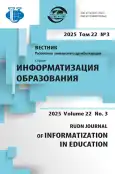Сравнительный анализ международных практик обучения программированию школьников
- Авторы: Босенко Т.М.1, Садыкова А.Р.1, Левченко И.В.2
-
Учреждения:
- Московский городской педагогический университет
- Московский педагогический государственный университет
- Выпуск: Том 22, № 3 (2025)
- Страницы: 255-267
- Раздел: ОБУЧЕНИЕ ИНФОРМАТИКЕ
- URL: https://journal-vniispk.ru/2312-8631/article/view/321322
- DOI: https://doi.org/10.22363/2312-8631-2025-22-3-255-267
- EDN: https://elibrary.ru/QEMSMM
- ID: 321322
Цитировать
Полный текст
Аннотация
Постановка проблемы. Представлен сравнительный анализ международных практик по обучению программированию школьников в условиях технологизации современного общества. Цель исследования - выявление наиболее эффективных практик обучения программированию на основе комплексного анализа международного опыта для оценки целесообразности их внедрения в систему российского образования школьников. Исследование охватывает опыт девяти стран (Великобритания, Германия, Китай, Сингапур, США, Финляндия, Эстония, Южная Корея, Япония), выбранных как репрезентативные представители различных образовательных систем и лидеры цифровой трансформации образования в своих регионах. Методология. На основе комплексного анализа выявлены и классифицированы три основные модели обучения программированию: интегрированная, специализированная и гибридная. Компаративный анализ международных практик позволил провести сравнительное изучение образовательных систем различных стран. Статистический анализ показателей эффективности основывался на обработке количественных данных об успеваемости учащихся по результатам международных исследований. Результаты. Позволили сформулировать научно обоснованную оценку целесообразности внедрения международных практик в образовательную систему с учетом возрастных особенностей учащихся. Заключение. Установлено, что наиболее успешные международные образовательные системы характеризуются сбалансированным развитием инфраструктурного, методологического и кадрового компонентов.
Об авторах
Тимур Муртазович Босенко
Московский городской педагогический университет
Email: bosenkotm@mgpu.ru
ORCID iD: 0000-0002-5375-096X
SPIN-код: 7117-2458
доцент департамента информатики, управления и технологий, Институт цифрового образования
Российская Федерация, 129594, Москва, ул. Шереметьевская, д. 28Альбина Рифовна Садыкова
Московский городской педагогический университет
Автор, ответственный за переписку.
Email: sadykovaar@mgpu.ru
ORCID iD: 0000-0002-1413-200X
SPIN-код: 7107-7576
профессор департамента информатики, управления и технологий, Институт цифрового образования
Российская Федерация, 129594, Москва, ул. Шереметьевская, д. 28Ирина Витальевна Левченко
Московский педагогический государственный университет
Email: iv.levchenko@mpgu.su
ORCID iD: 0000-0002-1388-4269
SPIN-код: 8484-7769
доктор педагогических наук, профессор кафедры теории и методики обучения математике и информатике, Институт математики и информатики
Российская Федерация, 107140, Москва, ул. Краснопрудная, д. 14, стр. 1Список литературы
- Huang S, Liu C, Xu Y. A Comparative study on programming education – based on China and America. Journal of Education, Humanities and Social Sciences. 2023;15: 220–231. https://doi.org/10.54097/ehss.v15i.9272
- Lee I, Grover S, Martin F, Pillai S, Malyn-Smith J. Computational thinking from a disciplinary perspective: integrating computational thinking in K-12 science, technology, engineering, and mathematics education. Journal of Science Education and Technology. 2019;29(1):1–8. https://doi.org/10.1007/s10956-019-09803-w
- Lindberg R, Laine T, Haaranen L. Gamifying programming education in K-12: a review of programming curricula in seven countries and programming games. British Journal of Educational Technology. 2019;50(4):1979–1995. https://doi.org/10.1111/bjet.12685
- Waite J, Curzon P, Marsh W, Sentance S. Difficulties with design: the challenges of teaching design in K-5 programming. Computers and Education. 2020;150:103838. https://doi.org/10.1016/j.compedu.2020.103838 EDN: WTWMDG
- Pasternak A, Hellmig L, Röhner G. Standards for higher secondary education for computer science in Germany. In: Pozdniakov SN, Dangiené V. (eds.) Informatics in Schools. Fundamentals of Computer Science and Software Engineering: 11th International Conference on Informatics in Schools: Situation, Evolution, and Perspectives, ISSEP 2018, 10–12 October 2018, St. Petersburg, Russia. Cham: Springer; 2018. p. 103–114. https://doi.org/10.1007/978-3-030-02750-6_9
- Sianturi M, Lee J, Cumming T. Using technology to facilitate partnerships between schools and Indigenous parents: a narrative review. Education and Information Technologie. 2023;28(5):6141–6164. https://doi.org/10.1007/s10639-022-11427-4 EDN: PQDDTJ
- Seow P, Looi CK, How ML, Wadhwa B, Wu LK. Educational policy and implementation of computational thinking and programming: case study of Singapore. In: Kong S-Ch, Abelson H. (eds.) Computational Thinking Education. Singapore: Springer; 2019. p. 337–345. https://doi.org/10.1007/978-981-13-6528-7_19
- McGill M, Reinking A. Early findings on the impacts of developing evidence-based practice briefs on middle school computer science teachers. ACM Transactions on Computing Education. 2022;22(4):1–29. https://doi.org/10.1145/3543512
- Korhonen T, Salo L, Laakso N, Seitamaa A., Sormunen K, Kukkonen M, Maanonen H. Finnish teachers as adopters of educational innovation: perceptions of programming as a new part of the curriculum. Computer Science Education. 2022;33(1):94–116. https://doi.org/10.1080/08993408.2022.2095595 EDN: CGXTDF
- Pata K, Tammets K, Vyaljataga T, Kori K, Laanpere M, Rybtsenkov R. The patterns of school improvement in digitally innovative schools. Technology, Knowledge and Learning. 2022;27(3):823–841. https://doi.org/10.1007/s10758-021-09514-5 EDN: IWIAQM
- Kim K, Koo D, Kim Se, et al. Development a standard curriculum model of nextgeneration software education. Journal of The Korean Association of Information Education. 2020;24(4):337–367. https://doi.org/10.14352/jkaie.2020.24.4.337 EDN: APFRJS
- Yamanaka Sh, Suzuki K. Japanese education reform towards twenty-first century education. In: Reimers FM. (ed.) Audacious Education Purposes. Cham: Springer; 2020. p. 81–103. https://doi.org/10.1007/978-3-030-41882-3_4
- Barhatova DA, Lomasko PS, Pak NI. Smart environment model for training future informatics teachers in programming under network cluster-distributed integration. Informatics and Education. 2018;(8):11–19. (In Russ.) https://doi.org/10.32517/02340453-2018-33-8-11-19 EDN: YNHKJF
- Cheng M. An overview of STEM education in Asia. In: Cheng M, Buntting C, Jones A. (eds.) Concepts and Practices of STEM Education in Asia. Singapore: Springer; 2022. p. 1–15. https://doi.org/10.1007/978-981-19-2596-2_1
- Zhang W, Zeng X, Wang J, Ming D, Li P. An analysis of learners programming skills through data mining. Education and Information Technologies. 2022;27(8):11615– 11633. https://doi.org/10.1007/s10639-022-11079-4 EDN: ADQHDQ
- Mannila L, Dagiene V, Demo B, Grgurina N, Mirolo C, Rolandsson L, Settle A. Computational thinking in K-9 education. In: Clear A, Lister R. (eds.) ITiCSE- WGR ‘14: Proceedings of the Working Group Reports of the 2014 on Innovation & Technology in Computer Science Education Conference, 23–25 June 2014, Uppsala, Sweden. New York: Association for Computing Machinery; 2014. p. 1–29. https://doi.org/10.1145/2713609.2713610
- Kong S, Lai M, Sun D. Teacher development in computational thinking: design and learning outcomes of programming concepts, practices and pedagogy. Computers & Education. 2020;151:103872. https://doi.org/10.1016/j.compedu.2020.103872
Дополнительные файлы









